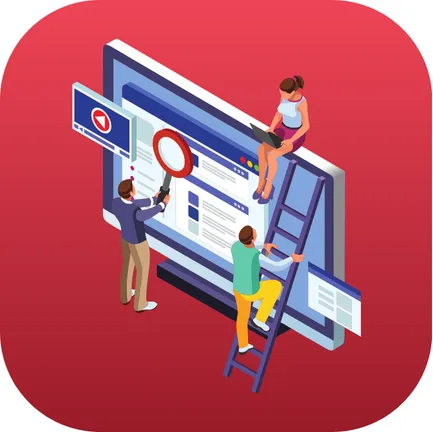AIMD Services


Digital Marketing
Digital marketing services encompass a range of online strategies and tactics used to promote businesses and connect with customers through various digital channels.
These services aim to drive traffic, generate leads, and increase brand awareness, ultimately boosting sales and achieving business goals.
Here's a breakdown of common digital marketing services:

Search Engine Optimisation (SEO)

Pay-Per-Click
(PPC) Advertising

Social Media
Marketing (SMM)
What It Is
Improving website visibility in search engine results to attract more organic traffic.
How It Works
Analysing keywords, optimising site structure, and enhancing user experience to improve search rankings.
Benefits
Higher website visibility, increased organic traffic, and improved online credibility.
What It Is
Targeted online advertising where businesses pay only for clicked ads.
How It Works
Creating strategic ad campaigns targeting specific keywords and demographics.
Benefits
Immediate traffic, precise audience targeting, and measurable marketing results.
What It Is
Leveraging social platforms to build brand awareness and engage with customers.
How It Works
Creating engaging content, running targeted ads, and interacting with online followers.
Benefits
Increased brand recognition, customer engagement, and community building.

Content
Marketing

Marketing
What It Is
Creating valuable content to attract and retain a specific audience.
How It Works
Developing diverse content formats like blogs, videos, and infographics.
Benefits
Establishing brand authority, generating leads, and nurturing customer relationships.
What It Is
Sending targeted email communications to connect with customers.
How It Works
Developing strategic email campaigns and segmenting audience lists.
Benefits
Direct marketing, cost-effective communication, and measurable engagement.
Web Presence
Web presence services encompass the digital strategies and technologies that establish and maintain a business's online visibility and functionality.
These services aim to create a professional, effective, and user-friendly digital platform that supports business growth and customer engagement.



Website
Creation

Website
Hosting

E-commerce
Solutions
What It Is
Developing comprehensive web solutions that transform a business's online identity.
How It Works
Creating custom designs, responsive layouts, and user-friendly website interfaces.
Benefits
Enhanced online credibility, improved customer interaction, and increased conversion rates.
What It Is
Providing secure and reliable hosting infrastructure for websites.
How It Works
Implementing advanced server technologies with consistent uptime and backup solutions.
Benefits
Continuous online presence, enhanced security, and professional technical support.
What It Is
Creating integrated online platforms for digital sales and market expansion.
How It Works
Developing secure payment systems, product catalogues, and streamlined shopping experiences.
Benefits
24/7 sales capabilities, expanded market reach, and simplified transaction processes.


Brand & Digital Identity
Brand and digital identity services focus on creating a cohesive, memorable, and professional visual and strategic representation of a business across digital platforms.
These services aim to differentiate businesses, communicate their unique value, and create lasting impressions with target audiences.

Brand & Logo
Design

Digital
Copywriting

Brand Storytelling
& Positioning
What It Is
Crafting visual identities that capture a business's essence and market positioning.
How It Works
Developing strategic design concepts and comprehensive brand guidelines.
Benefits
Distinctive brand recognition, professional image, and visual communication.
What It Is
Creating compelling written content that reflects a brand's unique voice.
How It Works
Developing tailored messaging strategies across multiple digital platforms.
Benefits
Distinctive brand communication, enhanced audience engagement, and consistent messaging.
What It Is
Developing a narrative that articulates a brand's unique value and market position.
How It Works
Conducting brand research and creating strategic positioning statements.
Benefits
Emotional audience connection, competitive differentiation, and brand loyalty.
Digital Management
Emerging technology services explore and implement cutting-edge technological solutions that provide businesses with innovative competitive advantages.
These services aim to leverage advanced technologies to solve complex business challenges and create new opportunities.



Digital Presence Management

Digital Reputation Management

Social Media
Management
What It Is
Strategically managing a business's online brand representation.
How It Works
Coordinating cross-platform digital strategies and monitoring online reputation.
Benefits
Unified brand representation, enhanced online visibility, and digital credibility.
What It Is
Proactively monitoring and protecting a business's online reputation.
How It Works
Implementing online monitoring tools and developing strategic response protocols.
Benefits
Enhanced brand credibility, rapid crisis management, and positive online perception.
What It Is
Developing and executing comprehensive social media strategies.
How It Works
Creating content calendars, producing engaging social media content, and analysing performance.
Benefits
Increased brand awareness, improved customer engagement, and expanded digital reach.


Customer Relationship Management
CRM is a software system that helps businesses store and manage customer data, track interactions, and automate tasks related to sales, marketing, and customer service.
Purpose:
The primary goal of CRM is to improve customer relationships, leading to increased customer satisfaction, loyalty, and ultimately, business growth.
The Value for Small Businesses

Improved Customer Relationships

Increased
Sales

Enhanced
Customer Service
CRM helps businesses understand their customers better, enabling them to provide more personalized and relevant experiences.
By streamlining the sales process and providing better insights into customer behaviour, CRM can help small businesses close more deals.
CRM allows businesses to quickly access customer information and resolve issues efficiently, leading to higher customer satisfaction.

Better Marketing Campaigns

Increased
Efficiency

Data-Driven
Decision Making
CRM helps businesses segment their customer base and target their marketing efforts more effectively, leading to higher ROI.
By automating tasks and centralizing data, CRM can free up valuable time and resources for small business owners and employees.
CRM provides valuable data and insights that can help small businesses make more informed decisions about their business strategy.

Centralised
Database

Improved
Communication
CRM acts as a central repository for all customer data, ensuring that everyone in the organization has access to the same information.
CRM facilitates better communication with customers by providing a centralized platform for tracking interactions and managing communications.
Ready to Stand Out
Against Bigger Competitors?
Contact us today to discuss how our specialised services can help your small or medium business compete and win in your market— not by outspending the competition, but by outsmarting them with targeted, effective marketing strategies.


© 2025 Australian Institute Marketing Dynamics
All Rights Reserved.
We acknowledge the Traditional Owners of country throughout Australia and recognise their continuing connection to land, waters and culture.
We pay our respects to their Elders, past, present and emerging.
© 2026 Company Name - All Rights Reserved, consectetur adipiscing elit. Maecenas commodo suscipit tortor, vel tristique sapien
